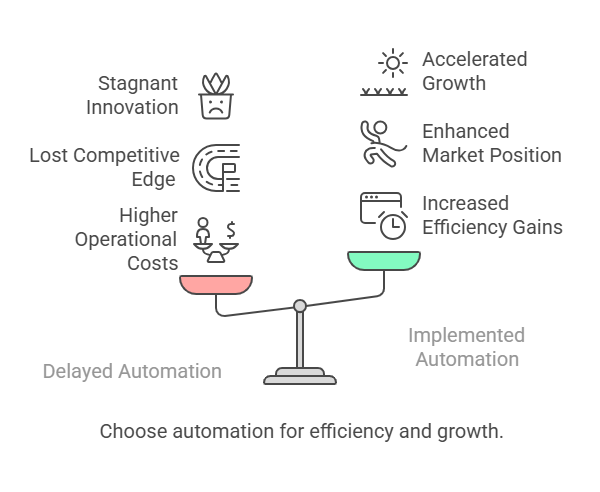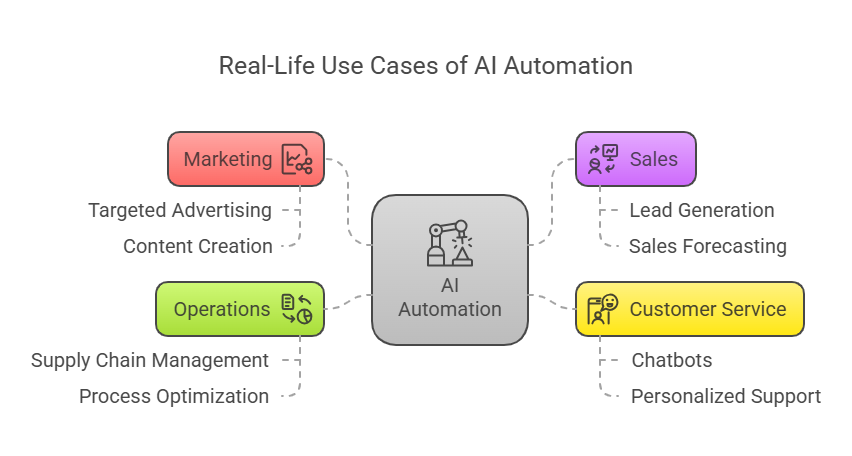The Problem — Why Manual Processes Are Costing You in 2025
AI-powered automation has become essential in 2025 because businesses across the globe are still bogged down with repetitive, manual tasks that drive up costs and reduce agility.
Common issues include:
- Data entry across multiple platforms
- Spreadsheet tracking and follow-ups
- Customer service overload
- Delays in invoicing, onboarding, and reporting
These inefficiencies:
- Drain time
- Inflate hiring needs
- Reduce team morale
- Hurt innovation and speed
The Impact — What Delayed Automation Is Truly Costing You
What Is This Truly Costing You? For businesses not using an AI-driven automation solution, they are probably spending on average:
Businesses that haven’t implemented AI-powered automation tools are spending:
- $5,000–$50,000/month in unnecessary human labor
- 60–100+ hours/week on non-core operations
- Losing 20–30% productivity across departments
- Facing delayed project launches and missed opportunities
In the hyper-competitive digital economy of 2025, speed = success. If you are not optimized, your competitors are optimized and they are closing business while you are still formatting EXCEL spreadsheets.

The Solution — How AI-Powered Automation Changes Everything
What Is AI-Powered Automation?
AI-powered automation uses machine learning and artificial intelligence to mimic human intelligence in business workflows.
Unlike traditional RPA, AI can:
- Interpret unstructured data
- Make decisions in real time
- Continuously learn and improve
Real-Life Use Cases of AI Automation
Businesses are using AI-powered automation in:
- Marketing
- Personalizing campaigns
- A/B testing content
- Auto-generating emails and ads
- Sales
- AI-driven lead scoring
- Automated outreach
- CRM updates in real-time
- Customer Service
- Chatbots & voice AI handling 80% of queries
- Automated ticket routing
- Self-learning FAQ bots
- Operations
- Auto-updates in Slack/Notion
- Real-time reporting
- Invoicing & reminders without manual input

Department-Specific Use Cases of AI-Powered Automation
1. Startups & Founders
- Automate 50% of operations
- MVP iterations in half the time
- Delegate to digital agents, not people
2. Marketing
- AI-written ad copy
- Smart social scheduling
- Analytics and reporting with zero input
3. Sales
- Predictive lead scoring
- Automated outreach via WhatsApp, Gmail
- Auto-pipeline management
4. Customer Success
- Detect churn early
- Trigger support workflows
- Auto-run satisfaction surveys
Why Codepaper Is the Smart Choice for AI-Powered Automation
At Codepaper, we specialize in helping startups and scaling businesses unlock the power of AI-powered automation in just 48 hours.
With us, you’ll:
- Save thousands in monthly ops costs
- Skip the dev team waitlist
- Implement automation fast, without code
Whether you’re a solo founder or running a growing team, we make AI automation simple, effective, and ROI-driven.
Conclusion — The Smartest Businesses Are Automating in 2025
In 2025, AI-powered automation isn’t a luxury—it’s essential.
Companies that automate now will:
- Outperform competitors
- Operate leaner
- Scale faster
⏳ Don’t wait for your competitors to leave you behind.
Don’t Let Manual Work Slow You Down in 2025
Join the AI automation movement and grow smarter, leaner, and faster.
🎯 Book Your Free Demo with Codepaper
FAQs
Q: What is AI-powered automation?
AI-powered automation** combines artificial intelligence with traditional automation to perform tasks more intelligently. Unlike basic automation that follows set rules, AI-powered systems learn from data, make decisions, and improve over time—making them ideal for complex business processes.
Q: Is AI-powered automation suitable for small businesses?
Absolutely. Many AI tools are built for scalability and offer plans tailored to small and medium-sized businesses (SMBs). Even simple automations can save dozens of hours per month and help small teams punch above their weight.
Q: How quickly can a business see ROI from AI automation?
Most businesses start seeing a return on investment (ROI) within 30–90 days after implementation—especially when automating time-consuming processes like customer onboarding, invoicing, and marketing workflows.
Q: Can AI-powered automation improve employee productivity?
Yes. By handling routine tasks, AI frees up employees to focus on creative, strategic, and revenue-generating work. This leads to higher job satisfaction and significantly improved team productivity.
Q: Is AI automation secure and compliant with data regulations?
Modern AI automation platforms are built with security protocols and often comply with GDPR, HIPAA, and other standards. However, businesses should ensure data privacy by choosing trusted vendors and regularly auditing workflows.

